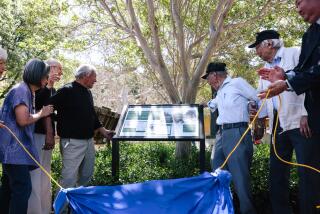Alumni of Nazi’s ‘Escape-Proof’ Colditz Hold Reunion in London
- Share via
LONDON — Wartime prisoners of Colditz Castle, Nazi Germany’s maximum security jail, were reunited in London on Friday 40 years after they were liberated by American troops.
The Nazis called Colditz escape-proof, but 120 of its 400 prisoners broke out and 35 made it to freedom. The 110 former inmates who gathered at London’s Imperial War Museum for the reunion exchanged stories of their escapes and looked at displays of prison memorabilia.
Retired British Lt. Cmdr. Mike Moran, the Colditz veteran who organized the reunion, said: “I fear this could be the last. We are all getting long in the tooth and our ranks are getting thinner.”
Maximum Security
Colditz, 90 miles south of Berlin, was where the Nazis kept prisoners recaptured after escaping from less heavily guarded camps during World War II.
While the Nazis boasted that Colditz was impregnable, the prisoners of a dozen nationalities considered it their duty to escape, going as far as to build a glider under the Germans’ noses to fly them to freedom.
A replica of the glider, made from bedsheets and bits of wood, was on display at the reunion at the Imperial War Museum. The prisoners were freed in April, 1945, before the glider escape could be tried.
Other memorabilia exhibited were banknotes and forged papers hidden in a Monopoly board, shoe brushes with secret compartments and a compass hidden in a pen.
Prison ‘Bad Boy’
Among overseas visitors was Peter Tunstall, 66, from Johannesburg, South Africa, who was dubbed one of Colditz’s “bad boys,” spending a total of 415 days in solitary confinement.
“The Germans got very fed up with me and I got very fed up with them. But I’ve never laughed more than when I was in the camp although it was bloody miserable at times,” he said.
Pat Reid and Billy Stephens remembered escaping disguised as French workmen. “I had made the clothes from ordinary Royal Air Force troops’ blue cloth,” said Reid, now 74.
Stephens said: “I was extremely fortunate. We found a sewer which ran under the old part of the castle which led to a moat. We got through the moat, cut the wire, got out and got a train into Switzerland.”
One group escaped by sneaking past the guards while the prisoners’ orchestra played and the conductor kept watch, stopping the music each time the sentry was off his guard.
More to Read
Sign up for Essential California
The most important California stories and recommendations in your inbox every morning.
You may occasionally receive promotional content from the Los Angeles Times.













